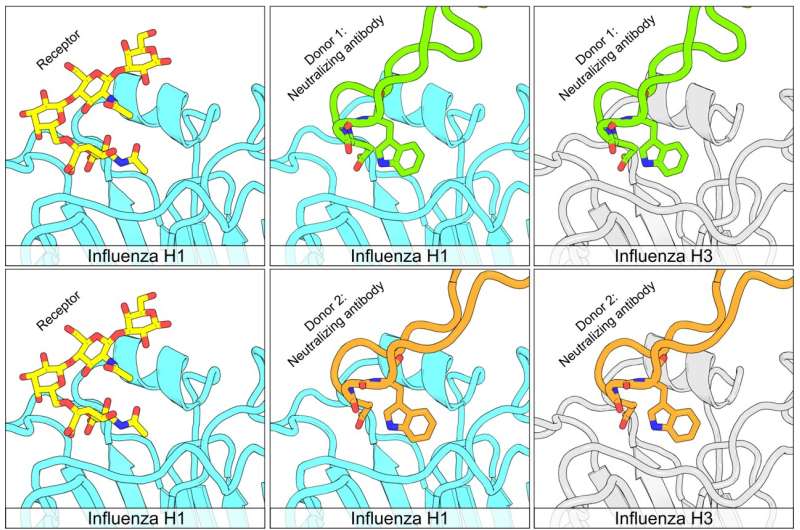This article has been reviewed according to Science X's editorial process and policies. Editors have highlighted the following attributes while ensuring the content's credibility:
fact-checked
peer-reviewed publication
trusted source
proofread
New type of antibody shows promise against multiple forms of flu virus

Researchers have identified a previously unrecognized class of antibodies—immune system proteins that protect against disease—that appear capable of neutralizing multiple forms of flu virus. These findings, which could contribute to development of more broadly protective flu vaccines, were published by Holly Simmons of the University of Pittsburgh School of Medicine and colleagues in the open access journal PLOS Biology.
A flu vaccine prompts the immune system to make antibodies that can bind to a viral protein called hemagglutinin on the outside of an invading flu virus, blocking it from entering a person's cells. Different antibodies bind to different parts of hemagglutinin in different ways, and hemagglutinin itself evolves over time, resulting in the emergence of new flu strains that can evade old antibodies. New flu vaccines are offered each year based on predictions of whatever the most dominant strains will be.
Extensive research efforts are paving the way to development of flu vaccines that are better at protecting against multiple strains at once. Many scientists are focused on antibodies that can simultaneously protect against flu subtypes known as H1 and H3, which come in multiple strains and are responsible for widespread infection.
Simmons and colleagues homed in on a particular challenge in this endeavor—a small change found in some H1 strains in the sequence of building blocks that makes up hemagglutinin. Certain antibodies capable of neutralizing H3 can also neutralize H1, but not if its hemagglutinin has this change, known as the 133a insertion.
Now, in a series of experiments conducted with blood samples from patients, the researchers have identified a novel class of antibodies capable of neutralizing both certain H3 strains and certain H1 strains with or without the 133a insertion. Distinct molecular characteristics set these antibodies apart from other antibodies capable of cross-neutralizing H1 and H3 strains via other means.
This research expands the list of antibodies that could potentially contribute to development of a flu vaccine that achieves broader protection through an assortment of molecular mechanisms. It also adds to growing evidence supporting a move away from flu vaccines grown in chicken eggs—currently the most common manufacturing approach.
The authors add, "We need annual influenza virus vaccines to keep pace with continuing viral evolution. Our work suggests that the barriers to eliciting more broadly protective immunity may be surprisingly low. Given the right series of influenza virus exposures/vaccinations, it is possible to for humans to mount robust antibody responses that neutralize divergent H1N1 and H3N2 viruses, opening new avenues to design improved vaccines."
More information: Simmons HC, Watanabe A, Oguin III TH, Van Itallie ES, Wiehe KJ, Sempowski GD, et al. (2023) A new class of antibodies that overcomes a steric barrier to cross-group neutralization of influenza viruses. PLoS Biology (2023). DOI: 10.1371/journal.pbio.3002415


















